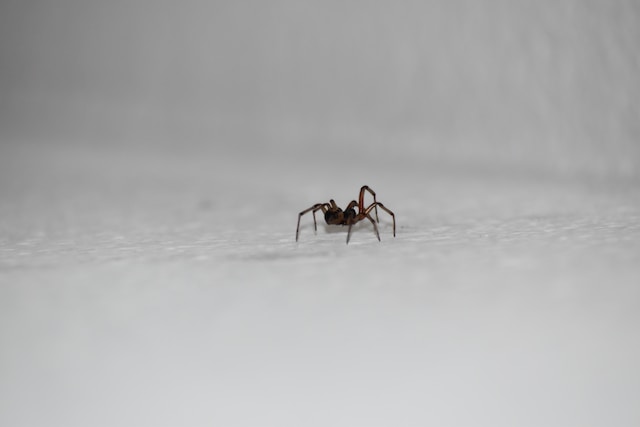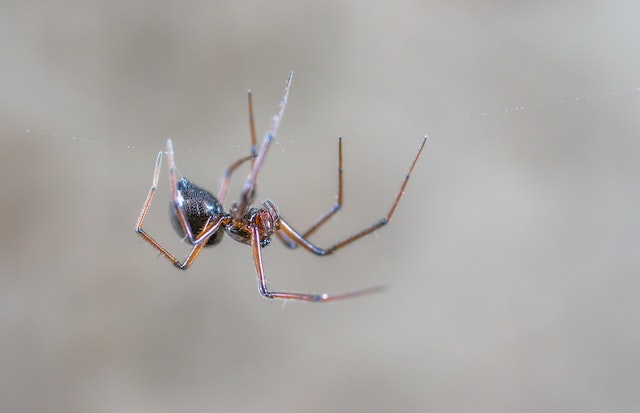In the ongoing battle against unwanted pests, spiders often find their way into our living spaces, posing challenges to homeowners seeking a pest-free environment. No matter the season, spiders appear everywhere around our properties, but how long can spiders live around our homes?
Balancing a pest-free home with spiders’ diverse lifespans requires a strategic pest control approach. In this blog, we delve into the lifespans of these arachnid invaders, exploring how they thrive indoors and outdoors.
How Long Can Spiders Live Indoors?
The lifespan of spiders can vary greatly depending on their species and the environmental conditions they encounter within our dwellings. Understanding the duration of their stay indoors can shed light on their behavior and impact on our living spaces.

Short-Lived Species
Some spider species have relatively short lifespans, lasting only a few weeks to a few months. A typical example is the common house spider, such as the American House Spider.
These arachnids usually live for about one to two years but may reach maturity within a few months. As they quickly complete their life cycle, they may be frequently seen indoors, building webs in corners, or tucked away in undisturbed areas.
Long-Lived Species
On the other end of the spectrum, certain spider species can have significantly longer lifespans indoors. For instance, the cellar spider, commonly known as the daddy long-legs, can live up to three years in indoor environments.
With a more extended stay, these spiders may establish stable populations within buildings and structures, becoming regular inhabitants of basements, garages, and dark corners.
Factors Affecting Spider Lifespan Indoors
So, how long can spiders live indoors? Various factors influence the longevity of spiders indoors, each playing a crucial role in their survival and reproduction. The availability of food is a vital aspect that impacts their lifespan.
Spiders primarily feed on insects and other arthropods, and a steady supply of prey can prolong their life and contribute to population growth. Spiders may remain active and thrive with a consistent food source within a property, such as flies or mosquitoes.
Additionally, the surrounding environment plays a significant role in determining spider lifespan indoors. Spiders are ectothermic creatures, meaning their body temperature is regulated by their surroundings. Warm and humid conditions can enhance their activity and extend their lifespan. A comfortable habitat can encourage spiders to establish webs and nests, leading to extended stays within buildings.
However, spiders also face threats from natural predators and human intervention. Some spider species fall prey to predators like certain wasps that actively hunt and feed on spiders. Additionally, human actions, such as applying insecticides as part of pest control measures, can reduce spider populations and affect their lifespan.
How Long Can Spiders Live Outdoors?
As a diverse group of arachnids, spiders demonstrate a wide range of lifespans shaped by their species, habitats, and environmental factors, especially when living outdoors. Their longevity can vary significantly, from just a few weeks to several years, depending on their characteristics and adaptations to the natural world.

How long can spiders live outdoors? Out in the open, spiders exhibit different lifespans, falling into two broad categories:
- Short-Lived Species: Some outdoor spider species lead relatively brief lives, living for just a few weeks to a few months. These spiders complete their life cycles quickly, and their presence may be transient. Notable short-lived outdoor spiders include certain orb-weaving spiders and agile jumping spiders.
- Long-Lived Species: Some outdoor spider species boast impressive longevity, spanning from one to several years. These spiders have adapted well to their outdoor habitats, thriving in specific environments. Among the long-lived are the funnel weavers (agelenids) and formidable wolf spiders (lycosids). These spiders have evolved mechanisms to withstand the challenges of the natural world and can endure for an extended period.
Several factors influence the lifespan of spiders outdoors. Larger spider species tend to live longer than smaller ones, benefiting from their physiological adaptations. Spiders adapted to specific habitats enjoy longer lifespans due to the favorable conditions they encounter.
Additionally, the presence of natural predators and access to prey significantly influence spider survival rates outdoors, playing a pivotal role in shaping their lifespans.
Short-lived spider species are more commonly found indoors. Their frequent appearances and swift development make their presence more noticeable within the confines of buildings and homes. Their ability to reproduce quickly and reach maturity allows them to establish transient populations indoors.
While long-lived spider species can thrive indoors and outdoors, their adaptability to different environments is crucial in shaping their lifespans. When living outdoors, they may benefit from a more stable and resource-rich environment, potentially leading to slightly longer lifespans than their indoor counterparts.
Spiders that predominantly reside outdoors are generally well-adapted to their natural habitats, where they have evolved to thrive. On the other hand, indoor spiders may face challenges in reproducing and establishing thriving populations as they are removed from their natural ecosystem.
Factors like temperature, humidity, prey availability, and interactions with other organisms are intricately balanced outdoors, promoting spiders’ longevity in their native habitats.
proof. Can Eliminate Spiders on Your Property!
Still wondering, “How long can spiders live?” Don’t worry– our skilled technicians conduct thorough inspections to identify spider infestations and their nesting sites. We employ effective targeted treatments against various spider species, tailoring our solutions to your needs.
Our top-notch pest control methods eliminate these arachnid invaders while minimizing the impact to your home. Say goodbye to spiderwebs and unwelcome eight-legged guests as we restore your property to a comfortable and pest-free haven.

